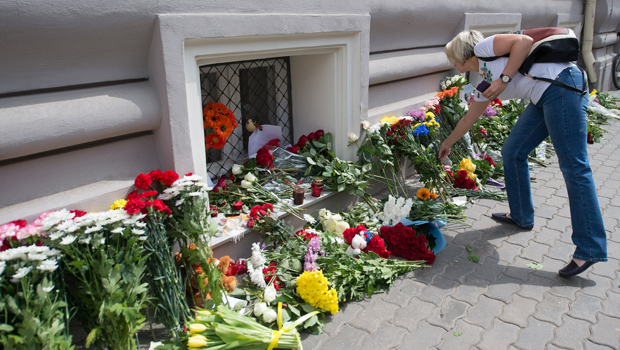Malaysia Air Flight 17: The aftermath
The aftermath of any plane disaster involves an intensive search for clues and evidence . . . and sometimes a bit of soul-searching as well, a process all the more complicated when the plane in question has been shot down in the middle of a war zone, with accusing fingers being pointed all around. Our Cover Story comes from Martha Teichner:
One by one, the 298 names on the manifest have become faces, stories -- Quinn Schansman, the only U.S. citizen; Australian Nick Norris and his three grandchildren; Malaysian Tambi Jiee, his wife, and their four children.
It's awful to see the smiling snapshots, after seeing the wreckage of Malaysia Flight 17.
"As we stared at the passenger list yesterday, we saw a capital "I" next to three; as we now know, the letter I stands for infant," said U.S. Ambassador to the U.N. Samantha Power. "To the families and friends of the victims, it is impossible to find words to express for our condolences."
Heartfelt, but so inadequate, the tributes laid outside Malaysian and Dutch embassies . . . so telling, this one in Moscow: it says, "Forgive us."
President Barack Obama said, "Evidence indicates that the plane was shot down by a surface-to-air missile that was launched from an area that is controlled by Russian-backed separatists inside of Ukraine."
The incident has suddenly and dramatically escalated U.S.-Russian animosities.
"We know that these separatists have received a steady flow of support from Russia," said Mr. Obama. "This includes arms and training. It include heavy weapons, and it includes anti-aircraft weapons."
Russian President Vladimir Putin held the U.S.-backed Ukrainian government responsible.
This blame game at the highest levels is a potentially dangerous extension of the nasty, regional conflict in the Ukraine.
In March Russia annexed Crimea, a chunk of the Ukraine where a lot of ethnic Russians live -- and got away with it. Then, Moscow pushed on, supporting the separatist rebels in the eastern Ukraine who want to break away and join Russia.
The United States and the European Union imposed limited financial sanctions, but have been reluctant to pick too big a fight with Vladimir Putin, for fear of retaliation in the areas of energy, trade, and international cooperation . . . that is, until the downing of Malaysia Air Flight 17.
"The status quo cannot persist," said Juan Zarate, a former deputy national security advisor, and a CBS News analyst. "You now have civilians that have been killed, and chaos that seems to be unfolding as a result of this conflict.
"This is all a game-changer, both in terms of the perception of the conflict and what happens next. I think this is a moment for the U.S. to consider what it's willing to do, how far it's willing to get involved. I think the Russians understand force, and they understand when there's policy clarity. When we lack clarity and we lack conviction of our words and our actions, that's when the Russians take advantage, and they've continued to take advantage and push the envelope to date."
This time, the United States is counting on the full court press of international outrage.
"It is an absolutely appalling, shocking, horrific incident," said British Prime Minister David Cameron.
And although mostly circumstantial or unverified, what appear to be damning details seem to implicate the separatists -- and link them to Russia.
The now famous intercepted phone call, released by the Ukrainian government, which blames the separatists. Supposedly separatist military commander Igor Bezler is telling a Russian intelligence officer, "We have just shot down a plane."
The Ukrainian state security service on Friday even distributed photographs of what it claims -- again, unverified -- could be the actual missile launcher suspected of shooting down the Malaysian jet headed for the Russian border.
"Putin has gotten himself into a terrible mess, really the most awkward position you could think of any Russian leader in 30 years, maybe 50 years," said Stephen Sestanovich, a former U.S. Ambassador-at-large to the Soviet Union, and a senior fellow at the Council on Foreign Relations.
"Putin is not ready to go down in flames for a bunch of ragtag separatists in eastern Ukraine," Sestanovich said. "If he does, he will show himself to be a far more short-sighted and incompetent leader than he looks right now. The most likely scenario here is for Putin to try to find a way to ease the pressures on him, to reduce the tensions and challenges that are largely of his own making."
More than half the victims from Flight 17 were from the Netherlands. Yesterday, the Dutch prime minister pleaded with Putin to intervene so at least the bodies could be sent home, saying afterward, "He has one last chance to show he means to help."
For Malaysian Airlines, the attack was a terrible, unbelievable double-whammy. Already reeling after the strange disappearance of Flight 370 in March, hemorrhaging money, its stock price down 25 percent. How could this happen again?
An Australian woman, Kaylene Mann, is asking the same question. After losing her brother and sister-in-law in that first crash, on Thursday her stepdaughter died in the second.
While the dead remain caught in the political crossfire, around the world -- the only way they know how -- ordinary people quietly express their sadness that such a thing could happen.
EDITOR'S NOTE: It was originally stated that Quinn Schansman was the only U.S. passport holder. Sources have told CBS News that while the young man was a dual citizen, he did not have a U.S. passport.
For more info:
